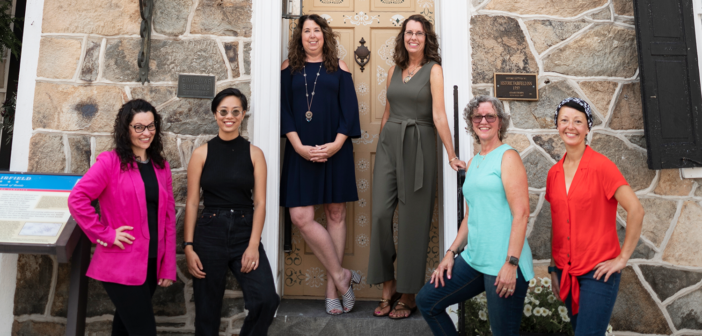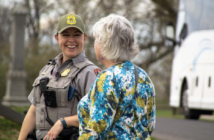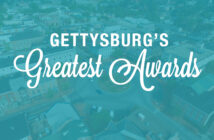Shining a light on Adams County women who inspired us amid the pandemic
By Karen Hendricks | Opening photo by Kelsey Kinard
Each one of us has experienced the pandemic and its challenges in different ways. Our families, jobs, and day-to-day habits all have been impacted—sometimes painfully so.
But there are also rays of light.
Inspirational people are in our midst, ensuring that Adams County not only survives, but thrives. Here are the stories of eight female role models who better our community by being innovative, tough, creative, strong, and, most of all, resilient.
Front-line Fortitude
If you asked Alison Arrowood to describe herself, resilient is not a word she would use. “It was never a word I ever associated with myself,” she says.
Instead, like a true leader, she credits her team at WellSpan Gettysburg Hospital for seeing the community through one of its most challenging situations ever: being on the front lines of the COVID-19 crisis.
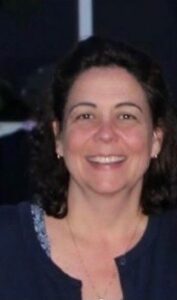
Arrowood, 56, has worked at the hospital for nearly 15 years, beginning as a registered nurse in the emergency department. She worked her way up to emergency department nursing operations director, overseeing about 100 employees. When the pandemic first hit, she remembers the initial concern and fear.
“People were getting really sick really fast because it wasn’t contained,” Arrowood says. “What are we going to do to keep our staff safe, while also finding a way to provide safe care to our patients?”
She helped open a tent specifically for COVID-19 testing. And she credits the hospital’s leadership team, “like an incident command team,” that met several times a week through the worst of the crisis.
“One of the biggest challenges was keeping everybody calm and not getting a sense of COVID hype or fear—not letting that overcome the department,” Arrowood says. “It was also making sure we had the appropriate PPE—protective masks and gowns—making sure everyone knew how to use it, making sure we weren’t spreading COVID, and then working day in and day out, making sure we had enough staff.”
Her leadership did not go unnoticed.
“During the pandemic, Alison oversaw the emergency department while functioning in incident command and continuing to assist clinically with patients. Then she initiated the set-up of our vaccine pod. She’s a real-life Wonder Woman,” says Michael Cogliano Sr., president of Gettysburg Hospital.
The roots of her resilience may have been planted during the first 12 years of her career as a paramedic firefighter in Maryland. In fact, her entire family has dedicated their careers to helping others; her husband and son are both in the fire service and her daughter also works for WellSpan Health.
“In emergency medicine, staying calm is the most important thing,” Arrowood says. “Then you can make good decisions.”
Pandemic Academics
As a new school year begins this fall, Wendy Stoner enters her 34th year of teaching first grade at Conewago Township Elementary School in the Conewago Valley School District. As a longtime educator, she’s pretty much seen it all, but…
“If you’d told me I’d be teaching from home, from an iPad, watching my kids on a screen, I would have laughed at you,” says Stoner. But that’s exactly what happened in spring 2020.
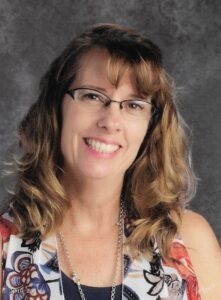
Stoner loves teaching first graders because they’re excited to learn, she says, but during the past two years, she learned a few new tricks of her own.
“It was a learning curve for me, but I had to learn how to use iPads, how to navigate Zoom—so I could teach the kids how to use their devices too,” she says.
When the pandemic first hit during the 2019-2020 school year, she and her students completed the school year remotely. To keep online learning interesting, she stepped outdoors.
Her rural Adams County home provided lots of science lessons. She recorded videos of herself teaching her students about the stream on her property, animal tracks, marks on trees where deer rubbed their antlers, and even a dead mouse and owl pellets.
“They were all signs of animal life, and I just tried to utilize what I had to keep the students engaged, because we couldn’t go anywhere,” Stoner explains.
She handled online school situations with the humor and expertise of a seasoned educator.
“I met a lot of pets on Zoom, baby brothers and sisters—which was fun—you got to see the kids in their environment,” says Stoner. “However, I did have to say, ‘Don’t take your iPad into the bathroom’ because they would raise their hands just like they were at school and ask, ‘May I use the bathroom?’”
Her fellow educators were also up for the challenge of educating during a pandemic. Second grade teacher Melissa Gantz “put herself out there 24/7 if we had tech problems,” says Stoner. “And Dr. Sanders, our principal, pulled all the kids and parents together to work together as a team.”
In the 2020-2021 school year, Stoner and her 21 students were in class nearly every day, but socially distanced.
“I often said, ‘We learn to share everything, but we don’t want to share our germs,’” Stoner says with a laugh. “For the most part, our kids are real resilient—it’s how we present things as the adult,” she adds, explaining that her students had no issues wearing masks daily.
How does she think the pandemic will ultimately affect students?
“The average child—and I hate to use that phrase—but children without learning difficulties will be fine,” Stoner says. “Students with difficulties—whether disabilities or slow learners—it’s going to take a little longer for them to adjust and catch back up, but with amazing teachers, administration, and parents’ support, I think we’re going to close the gap.”
Keeping the Beat
Krista Kriel had a lot of sleepless nights through the pandemic.
“In the middle of the wee hours of morning, my brain would be working and thinking about how I could give my students a musical experience to keep them connected,” says Kriel, Gettysburg Area High School orchestra teacher. “I was searching for different apps and different ways to record with online studios.”
The first program she found allowed students to collaborate online, but there were glitches with the tempo.

“In April and May [2020], I offered individual lessons; students could sign up each week to play for me, and I could give them feedback,” Kriel recalls. “Outside of that, I recorded a ton of me playing every single instrument, giving them tutorials and assignments to record themselves, then send them in to me. So it was a lot of listening and responding … a very different style of teaching.”
In summer 2020, Kriel went back to school herself to take two music technology classes. The school district upgraded Kriel’s computer. And, using money she normally spends for students to attend music festivals, she purchased recording equipment.
When the 2020-21 school year began, she was ready. Even though students were back in school, there were no live concerts until May, so students recorded their musical parts and Kriel assembled them into YouTube orchestra videos for families and the community to enjoy.
All the while, she also focused on family life. In spring 2020, the pandemic interrupted her youngest daughter’s senior year.
“Just finding time to cook or play games together was kind of like a breath of fresh air,” says Kriel. “As a family, we held a prom for Paige, had food, danced around our pool, and borrowed my dad’s convertible. We all dressed up, cruised around town, and tried to give her an experience she wouldn’t forget.”
Small Business, Appropriately, Serves Littlestown
Prior to the pandemic, people regularly told Monique Washirapunya that she should expand her tiny bakery, Littlestown’s Gateau Monique. But as it turns out, “not having those things—more seating, more space—were my saving grace,” she says.
She never had to close her doors because something she’d always done—operating as a small market by selling local eggs, milk, and coffee, in addition to her baked goods—was deemed essential.
“I really shifted into, ‘Let’s really allow the community to know if they don’t feel safe going to the bigger stores, they can walk here to get milk, eggs, or coffee.’ They could come into a tiny shop and feel a little more comfortable,” says Washirapunya.
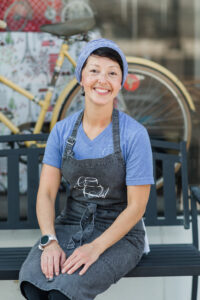
Her partnerships with local ag producers helped area residents stock their kitchens with household staples: Apple Valley Creamery’s milk, creamer, and juice; a Taneytown farmer’s eggs and cheese; Gettysburg’s Ragged Edge Roasting Co.’s coffee.
“Sales of pounds of coffee grew exponentially in one year, and now tons of people support a local roaster,” she says.
And Washirapunya collaborated with numerous small businesses, including Gettysburg Baking Co. and Eighty-Two Café.
“We were all trying to do the best we could, shifting with new regulations, supporting one another—that was really helpful to me because we were all doing the same things,” she says.
She also leaned on family for support, especially with supply chain challenges.
“I’m really thankful for my large extended family, because they helped me get boxes of disposable gloves,” she recalls; one family member tracked them down in Virginia and shipped them to her.
She continued baking Gateau Monique’s delicious scones, sticky buns, crumb bars with fresh fruits, bags of granola, cookies, and more—but she focused on pre-packaging everything to-go.
“On Mother’s Day weekend [in 2020], we were one of the only small businesses open,” says Washirapunya. “We had a line out the door for four hours, two blocks down the street, from 8 a.m. until 12 noon because we were offering cupcake boxes to celebrate Mom.”
Many days, she juggled baking, customers, and parenting her nearby 7- and 9-year old daughters with virtual schooling. Through it all, she tried to maintain a positive attitude, rather than frustration, because she wanted to set a positive example for her girls. Washirapunya also credits her church, Gettysburg Foursquare, with helping others in the community through prayer and outreach.
“That focus of helping others helps you, in turn, get out of your own head, which helped me stay resilient,” says Washirapunya. “I feel overly blessed that this community was supportive of this small business when others were shut down or limited. It’s terrible that tragedy happens, but through that, great things have happened in this community.”
Fitness Family
Tina Kendris of New Oxford started 2020 with a new outlook on life.
“My passion is Jazzercise,” she says. “I came to it late in life—I was 56 when I discovered it in 2016, but I was inspired to become an instructor and went through the training at the age of 57, which was quite hard but super fun.”
Kendris, an Army wife and mother of four boys, had worked as a secretary and teacher’s assistant, but didn’t necessarily have a fitness background.
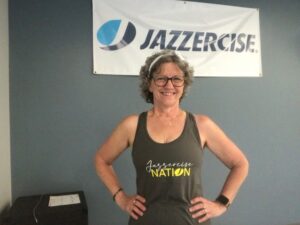
That selfless action of donating her kidney set a chain of events into motion.
“I’ve always been active—you can’t have four boys without being an active person,” she says with a laugh.
She believes she discovered Jazzercise at the right time in her life.
“In April of 2017, we learned my youngest son had chronic kidney disease and needed a transplant. As his mom, I gave him my left kidney,” says Kendris. “I believe because I started Jazzercise when I did, I became the healthy person that I am.”
“I felt prompted to pay it forward, so I approached the [Jazzercise] owner and said I’d like to build a building and make Jazzercise more available to greater numbers of people, because it provides not just an exercise but a community,”
she explains.
Kendris secured a location in the Adams Commerce Park, saw construction through—with high-end, cushioning flooring to be protective of joints—and opened the facility on January 31, 2020.
“On March 15, we closed because of the pandemic. It really broke my heart,” she says. “We were such a new business.
I was terrified.”
But following corporate guidelines from Jazzercise, she pivoted into virtual workouts via Facebook.
“My customers were inspirational,” Kendris says. “Teaching to a camera was tough, but knowing on the other side of the camera were customers who needed someone to make them smile and connect with each other—it was extremely inspirational and made us feel like we were a family.”
In mid-July, she was able to reopen the building, and by early 2021 she was able to outright purchase the business and rename it Battlefield Jazzercise.
“When you walk into the studio, you immediately become family,” she says. “It’s something I never experienced before and it’s such a beautiful thing,
I just want to share that.”
Keeping History Alive
When pandemic closures hit the Gettysburg National Military Park Museum and Visitor in March 2020,
Elle Lamboy remembers thinking it might last for two weeks, and then they’d be “back in action.”
As vice president of advancement and communications for the Gettysburg Foundation, she didn’t have a home office in her Hanover home, but she quickly converted a basement guest bedroom. Her husband managed home, parent, and school duties for their 5- and 7-year old sons upstairs, while she worked downstairs.
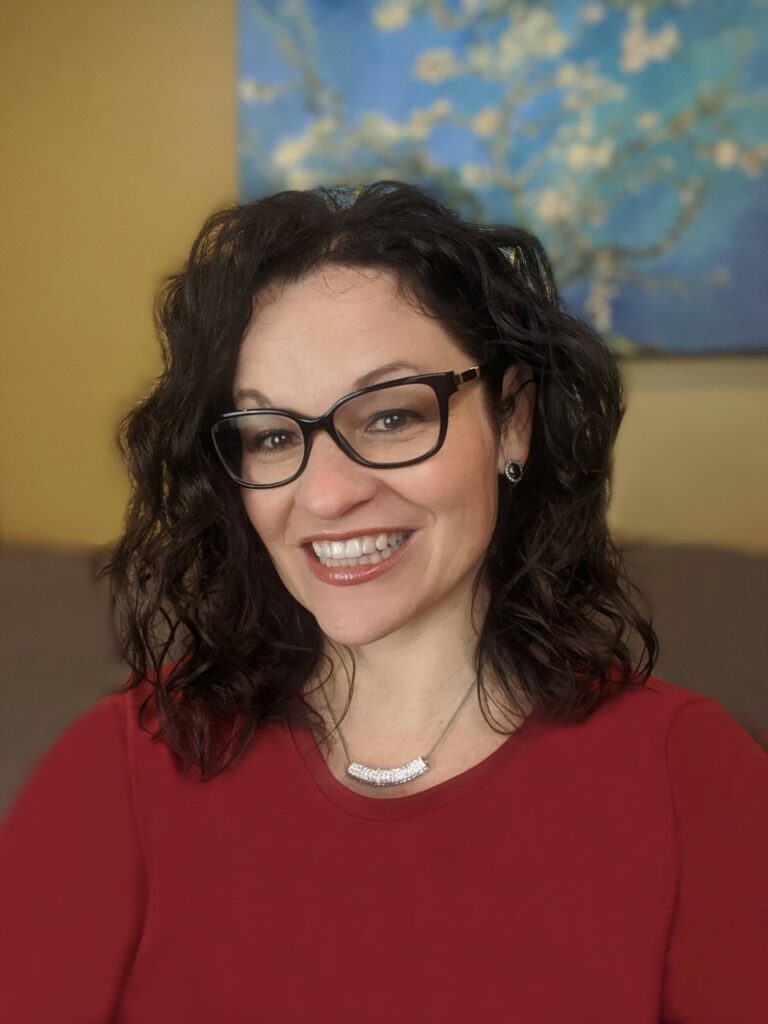
“It was a personal adjustment,” she says. “Once a day I would try to come up for lunch at least, and one day the boys put their sleeping bags in front of the basement door—they didn’t want me to go back downstairs, and I felt this horrible pull of them needing me, but my work team needing me too.”
The Gettysburg Foundation had to cancel huge events, including Spring Muster and school field trip visits. But they quickly pivoted to virtual Gettysburg experiences and leadership events utilizing creative new technologies.
“Before COVID, we had a very strong team dynamic, and we kept that going,” says Lamboy. “We had [Microsoft] Teams meetings all the time, video chat to keep each other informed, and allowed each other days to not be ok. Sometimes it meant having a meeting at 7 instead of 3 because there were kids involved, and we wanted to be human and kind with each other.”
She credits an outpouring of donations and support from Friends of Gettysburg members, and volunteers helped to overcome reopening challenges, such as social distancing and capacity limits.
“One of the standout moments was my staff member Ray making it his mission to make sure we had the volunteer task force there, to make sure we were ready to open and help visitors—that dedication to the Foundation is something that inspires me,” Lamboy says. Volunteers also continued working at the Sherfy Garden and donating produce to local food banks.
Not only did her work team emerge from the experience stronger, but so did her marriage.
“There was this really unique aspect of going back to simpler things,” says Lamboy, “like taking an evening walk, instituting family movie nights with popcorn … those things can easily get lost in the hustle and bustle, and I want to carry them onward.”
Small Business Beauty
Rebecca Muller was struck by the number of closed or struggling businesses in Gettysburg during the height of the pandemic.
“I saw some sad opportunities lining up in that buildings were vacant,” says Muller. And one location in particular she says was intriguing—the previous Subway sandwich location on Carlisle Street and its adjacent space—which she could visualize as a neighborhood flower shop.

Muller had been running a floral business for weddings and events out of her second floor Gettysburg apartment for about four years. She decided the time was right to make the leap to a brick and mortar location where she could “revive the love of local flowers in Gettysburg.”
“I opened on Small Business Saturday, November 28, 2020,” Muller remembers. “I felt like that was a really important date to hit, and it felt really symbolic. This year’s been all kinds of ups and downs, but the community has been incredibly supportive.”
Within several months of opening, the local community rallied to support her Indiegogo fundraiser with $3,000 toward a cold storage unit, vital for keeping florals fresh.
Her business name, Locaflora, summarizes what she does in a nutshell. She sources flowers from 30 small farms within a 100-mile radius of Gettysburg, and offers a wide variety of houseplants—
a market that’s seen exponential growth amid a homebound pandemic lifestyle.
Flowers and houseplants seem to be providing customers with a lot of hope.
“I know our business is slightly a luxury item, and so when you place that against the backdrop of coming off a pandemic, it can be a little difficult to embrace wholeheartedly,” Muller says. “That being said, flowers are one of those things that are also relatable. People express so many feelings with flowers, and that’s part of an expression the community can feel together.”
Pandemic Needs, Epic Proportion
Perhaps no one in the Adams County community felt the pandemic’s ripple effects across socioeconomic fracture lines more than Megan Shreve, CEO of South Central Community Action Programs (SCCAP).
She began bracing for the pandemic’s impact well before March 2020, thanks to two factors—she’s on WellSpan Health’s Board of Directors, plus her daughter studies microbiology and pandemics. Shreve ordered hand sanitizer well ahead of the curve, and she started moving medically-fragile shelter residents into alternate living situations. When the pandemic hit, community needs escalated.
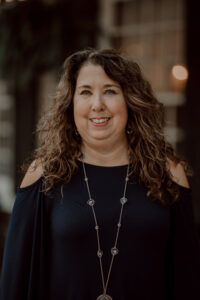
“When it came to food, the needs were so vast,” says Shreve, who’s been in the position for 16 years. “We had to adapt across the agency, making sure clients and staff stayed safe while we stayed open.”
Typically, SCCAP serves between 800 and 1,100 families monthly (equaling some 2,000 individuals) via the county’s food pantries. During COVID, those numbers increased by an additional 1,000 families (equaling nearly 3,000 individuals), “many that have never come to get food assistance before,” says Shreve.
She credits partners, such as the Rotary Club of Gettysburg and Adams County Community Foundation, for helping SCCAP provide more than $300,000 of food—“nearly three times what we spend in a year, plus,” Shreve says.
Her organization mobilized to help residents with basic human needs.
“You’re seeing tremendous needs, just astounding situations—people out of work, with no money or food—it’s hard to watch,” she says. “We called one family facing eviction on a Friday. We reached them on Wednesday, and they were at the hospital delivering a baby. The mom cried when we called to say we found rent for them. Stories of help for mortgages and utilities—those have been really hard.”
To date, SCCAP has provided $1.464 million in services—mostly rent and utility assistance—to more than 550 families over 18 months. Shreve obtained $6.5 million in emergency federal funding.
She credits a huge team network for coming together to help those in need, including her staff members Lisa Beaver from the food pantry; Marie Ford from WIC; Lori Mitchell from the Gleaning Project; Tonya Mincey with family services and Sarah Stokley for food deliveries; and community partners Kathy Gaskin of Healthy Adams County and Yeimi Gagliardi of WellSpan Health, who distributed food and vaccines.
Just touching the tip of the iceberg, innovative pivots at SCCAP included working with WellSpan Health to obtain tablets for virtual medical visits, partnering with RabbitTransit for transportation to testing sites, utilizing a window at SCCAP’s location to serve WIC clients, and creating educational medical videos, especially for Hispanic/Latino residents.
“Our staff was stretched thin, so you get tired, but it’s such important work,” Shreve says. “And I feel like this work will determine how our community will bounce back, so you have to keep going.”

